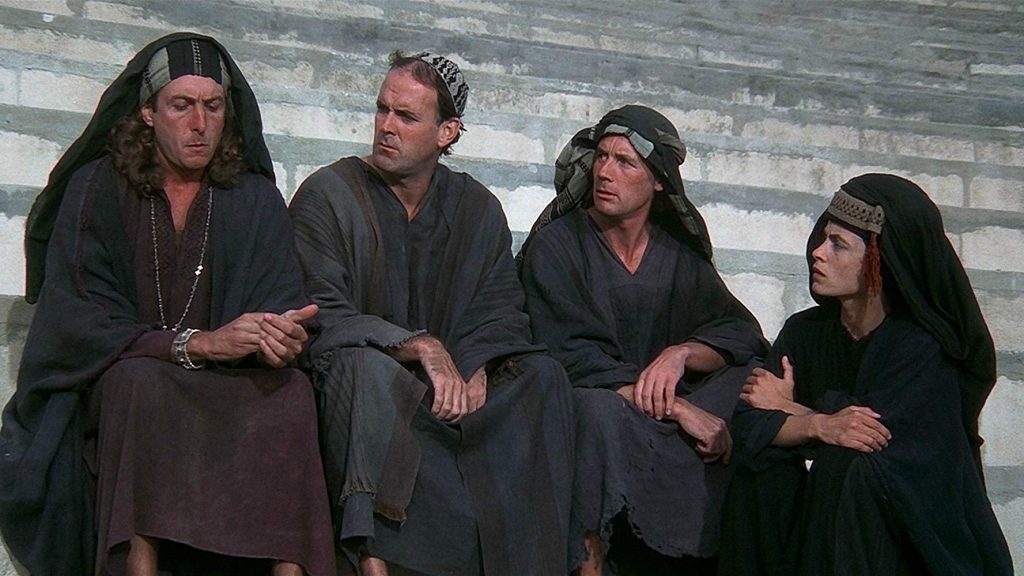Just as one can “overdose” on Christmas with all the movies, music and family obligations, I learned a valuable modern lesson this holiday season that one can also overdose on secularism. It crept up on me gradually and then before I knew it, I was up to my neck in a kind of neopagan quicksand.
It started, ironically enough, on Christmas. I was gifted a book. It was an autobiography of Monty Python alum Eric Idle. It was a fun, quick read. He is a talented writer with a kind of Groucho Marx meets John Lennon gift for word play. And his life is certainly worthy of the memoir treatment. There’s a tough, fatherless childhood, English boarding school mayhem and a seemingly limitless flow of popular culture icons weaving in and out both his personal and professional life. I like Monty Python a lot, but I never fooled myself into thinking their animus toward religion in general and Christianity in particular wasn’t as authentic as they were funny.
A good portion of the book is made up of how the comedy troupe of Monty Python came to be, came to fame and came close to killing each other all at the same time. But a book that deals so heavily in all things Python could not exclude a history of how they produced one of the most stupendously blasphemous movies known to mankind.
A lot I already knew, such as how former Beatle George Harrison (raised a Catholic, by the way) personally bank-rolled the film when no one would touch it with a ten-foot staff. Idle called it the most expensive movie ticket ever bought.
But true to his ingrained Anglo-Saxon bourgeois roots, even Eric Idle, one-sixth of one of the most cutting-edge comedy groupings of modern times, still had to tip his hat to Jesus even while he was bashing religiosity in his film script. He takes a knee in the middle of his memoir — in the American football sense, not the religious sense — by telling us readers how the Pythons never meant to attack Jesus personally.
Eric Idle tells us Jesus was this really special guy in the first century who taught peace, love, and understanding, and whose message was hijacked and derailed by religious zealots. It was the fools and the hypocrites who were the targets of the full Monty Python treatment.
When I read that part of Eric Idle’s book I was a little disappointed. Sounded like a sell-out. At least to me, it’s easier to like an unapologetic atheist apologist (try saying that three times fast) like the late Christopher Hitchens, who pulled no punches when it came to bashing all claims of the divine, than to read pablum about how nice Jesus was in a book that holds just about everything he taught in contempt.
In the Python Movie “Life of Brian,” there are multiple insane characters who all preach that they have the answer, and that they are the true messenger of God. The Pythons portrayed them as lunatics and comedic fodder. Yet, they leave the real Jesus alone even though he claimed the same thing, though maybe not quite as rabid. Which brings Eric Idle up against an immovable obstacle, a wall that once reached, the person on the other side either must break through it like Christopher Hitchens did, or walk around it as quietly as possible the way Eric Idle does in his book.
Hitchens said, yes, Jesus was EXACTLY like all those lunatics in the “Life of Brian” who went around declaring he had divine answers to the universe. Eric Idle on the other hand took the detour before getting to the wall, settling for Jesus as a nice enough bloke who taught nice things. As Chesterton and many others have demonstrated, Jesus doesn’t let us off the hook so easily.
Scripture informs us he didn’t come so much to teach as he did to be the word, to die and to rise from the tomb. “In the beginning was the word, and the word was with God and the word was God.” (John 1:1) …not bad word play there as well.
Not even Eric Idle or the rest of the Pythons can have it both ways. Jesus is either the same kind of buffoonish lunatic depicted in various manifestations in their magnum opus “Life of Brian” or he is exactly who he said he was…and IS.
Robert Brennan is a weekly columnist for Angelus online and in print. He has written for many Catholic publications, including National Catholic Register and Our Sunday Visitor. He spent 25 years as a television writer, and is currently the Director of Communications for the Salvation Army California South Division.
Start your day with Always Forward, our award-winning e-newsletter. Get this smart, handpicked selection of the day’s top news, analysis, and opinion, delivered to your inbox. Sign up absolutely free today!

